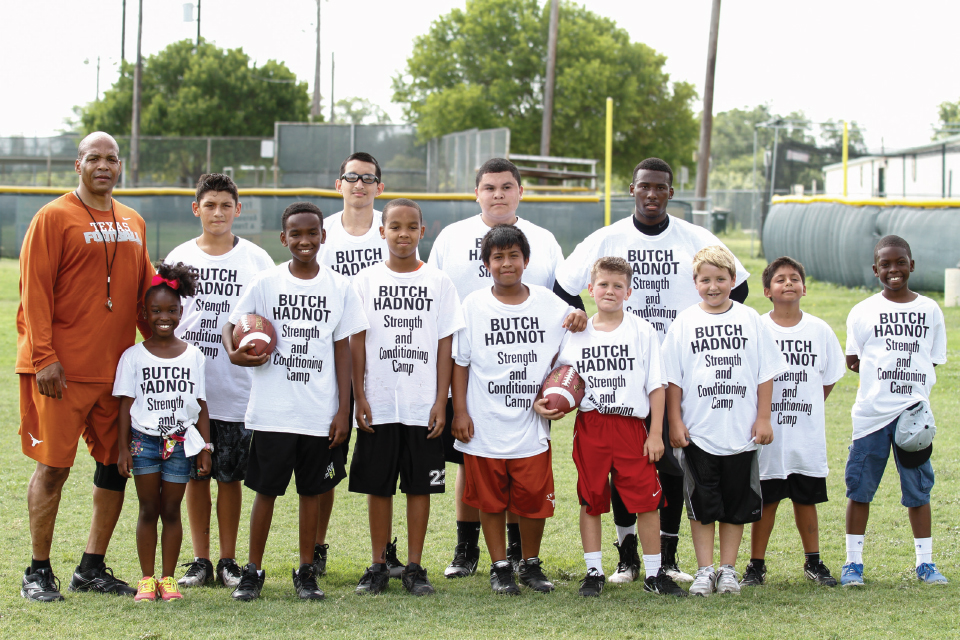Conditioning for Young Athletes

Butch Hadnot is a man with a passion. The former University of Texas football standout loves working with young athletes, so much so that he’s back in school and pursuing a degree in youth and community studies. “I want to prepare kids for high school [athletics],” Hadnot explained.
Not every coach or teacher has that soft spot for tweens and teens. But Hadnot found through working with his own family (he has a girl, 23, and two boys, 19 and 16 years old) that he enjoys this particular stage of life. He formed the Butch Hadnot Youth League (the initials also stand for Building Healthy Young Lives) to encourage “building positive relationships, self confidence, independence, and ability to deal with adversity” in young people through healthy and active lifestyles. His Summer Strength and Conditioning Skills Camp fits right in with these goals.
For seven consecutive weeks in the summer, Hadnot works with boys and girls ages 8 to 16 to help them improve their fitness for whatever sports they are pursuing. He consults with high school coaches to learn about the programs they’ve put together so that he can help youngsters develop the basics they need to succeed. “This continuity is a big part of success,” said Hadnot, “and I want to help coaches and kids mesh. I’d like to be an ambassador to [high school programs] on behalf of the up-and-coming kids.”
While his youth camp is designed to benefit players of any sport, Hadnot has a strong background in football and, one day, he’d love to see a coaching school for football. Hadnot coached arena football for the Austin Rockers after playing for the Tampa Bay Buccaneers, Toronto Argonauts, Shreveport Pirates (an expansion team), and Texas Terminators (an arena football team) following his years as a Longhorn (1990–91). But injuries and what he described as a “bumpy road” took him away from football. As Hadnot pointed out, “In order to win, you have to lose a few things.” The rocky times led him to reflect on what he wanted from life; two years ago, he consulted with several former Longhorn coaches—David McWilliams, Mack Brown—and current coach Charlie Strong, and found his calling.
“Don’t wait 22 years to come back and finish school,” he laughingly advised. “I am so thankful to UT for helping me to take care of my education now. There’s a time and a season for everything.”
Hadnot's Tips
The Strength and Conditioning Skills Camp met at the Georgetown Recreational Center on Saturdays from June to August, but Hadnot provided “homework” to be done during the week. Each athlete had nutritional information to put into practice, an emphasis on stretching everyday, and basic exercises to perfect. Parents were encouraged to stay and watch. And he has advice for parents of athletes who are preparing to become high school athletes; included here are some of Hadnot’s key concepts for parents.

Hydration involves more than just drinking—along with making sure kids are getting enough liquids, include food—like fruits—that provide fluids as well. Avoid fried food and fast food that may be overly salted.
Help lower body temperature—for hot weather workouts, a cold towel can come in handy. Pack one in a cooler to provide relief for hot skin and elevated body temperatures (place it on the back of the neck).
Make beverages handy—get your child a hand-held bottle so that he or she can carry water, if possible.
Utilize body weight workouts to build strength—you can provide a lot of exercise for a child without using weights. Focus on using body weight exercises, such as squats and push-ups to help your child get in shape.
Learn from losing—when your child is competing, look at the positives found in losing. Emphasize learning and the opportunity to realize areas for improvement.
Check parental expectations—this is important, especially for parents who are former athletes. Your child isn’t you, so kill those expectations and listen to your young athlete. Sit down to talk; discover what he or she wants to do. The starting point is, “Tell me what is the most important thing you want to do,” and go from there. Also, pump the brakes a little; don’t get so caught up in what your child is doing athletically that you lose sight that this is for his/her enjoyment.
Do your homework—checking out camps and organizations is a big part of being a parent to young athletes. Take the time to do the research before you sign your kid up. Make sure there’s a good fit and that the activity is appropriate for your child’s skills and interests.
Make sure your child is happy—that’s really the important part in student athletics.






